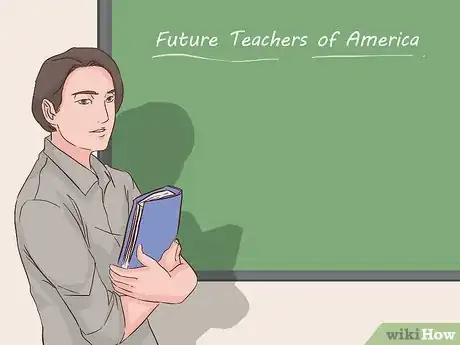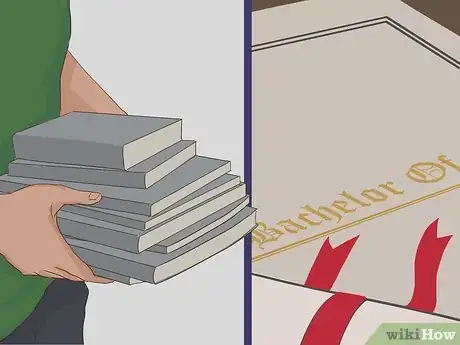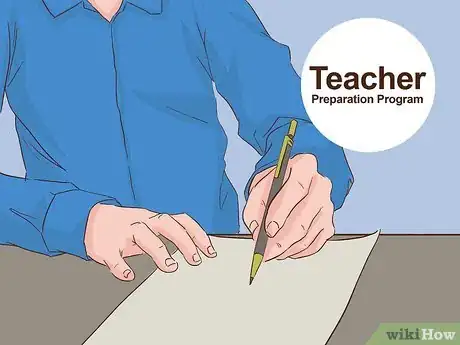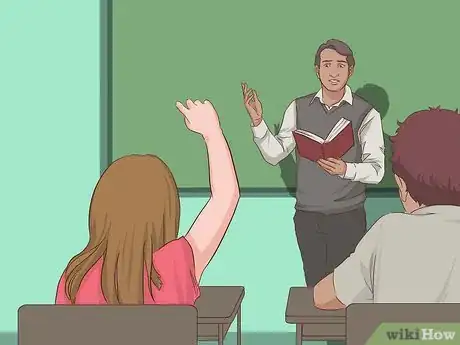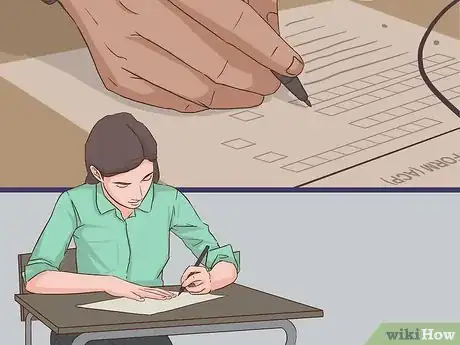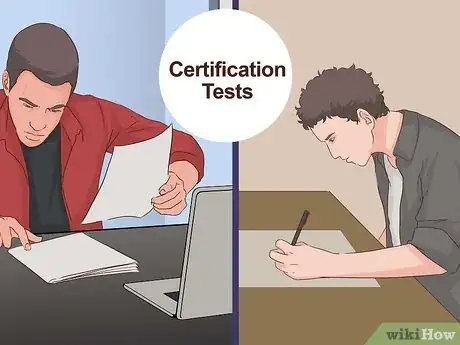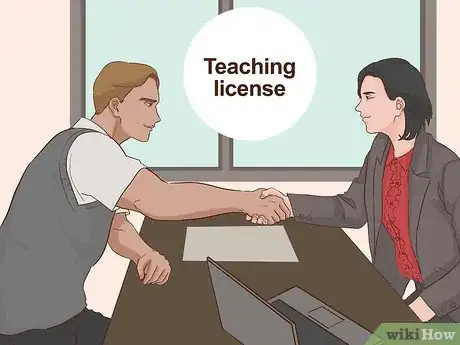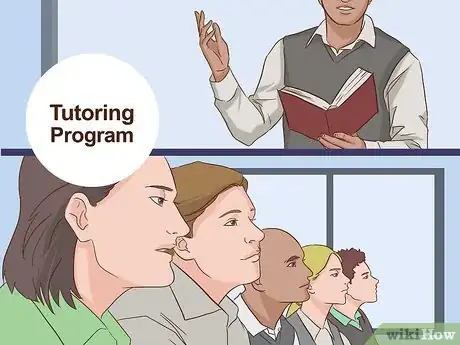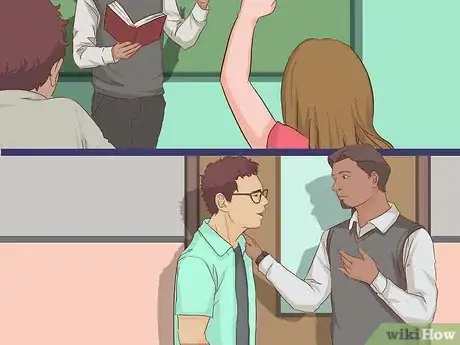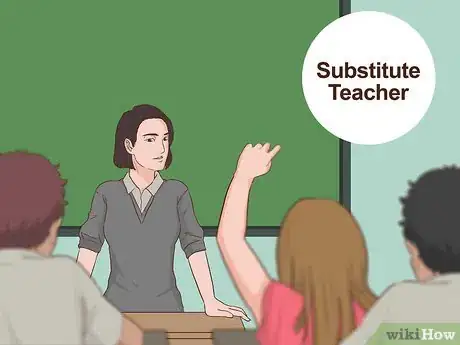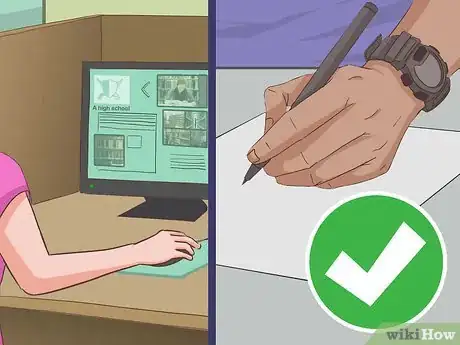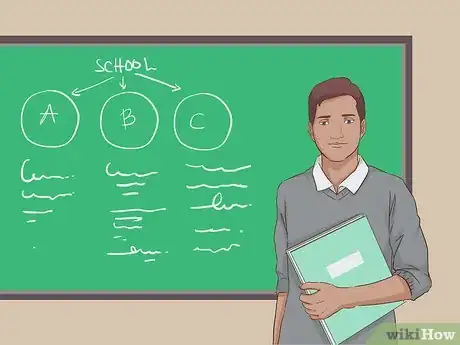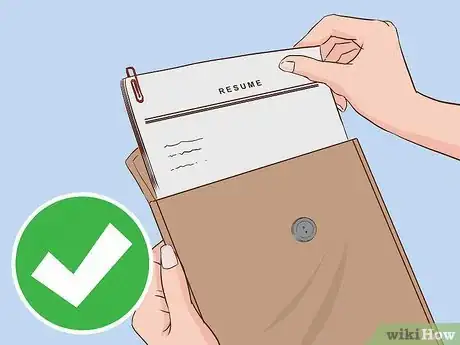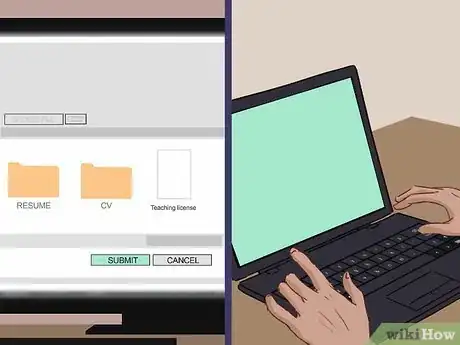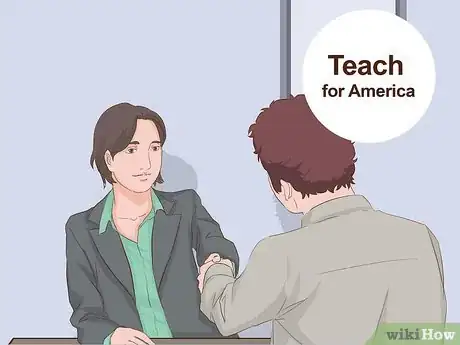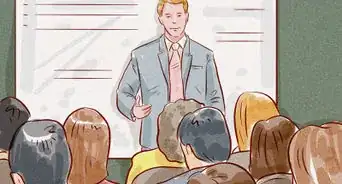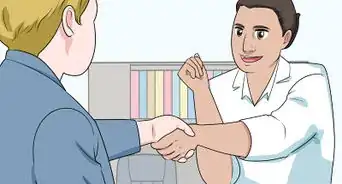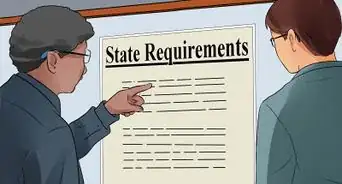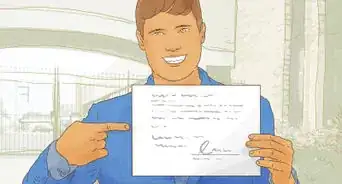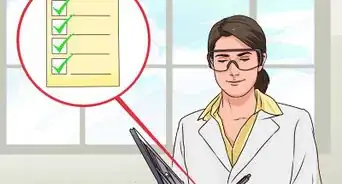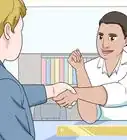This article was co-authored by Alyson Garrido, PCC and by wikiHow staff writer, Danielle Blinka, MA, MPA. Alyson Garrido is an International Coach Federation accredited Professional Certified Coach (PCC), Facilitator, and Speaker. Using a strengths-based approach, she supports her clients with job search and career advancement. Alyson provides coaching for career direction, interview preparation, salary negotiation, and performance reviews as well as customized communication and leadership strategies. She is a Founding Partner of the Systemic Coach Academy of New Zealand.
There are 8 references cited in this article, which can be found at the bottom of the page.
This article has been viewed 31,493 times.
Teaching is more than a career -- it’s a calling. If you have a passion for helping others and want to help young people learn, then you may choose to become a high school teacher. Once you’ve decided it's the right career for you, you'll need to earn your credentials and gain experience in working with young people. Then you'll need to apply for teaching jobs. You can also try substitute teaching or applying to a program that helps people get their first teaching job.
Steps
Earning Your Credentials
-
1Prepare to be a teacher before college. If you are still in high school, you can join a club for future teachers. You can also take a more active role in your school by becoming a peer tutor, starting a club, joining student council, or running for an officer position. Some schools even allow students to be teacher's assistants. If you've already graduated, you can volunteer at a high school, shadow a teacher, or become a substitute teacher.[1]
- Take more classes in your desired subject area than required as a way to prepare for your teaching career. For example, if you want to teach math, you could take 4 years of math even though 3 are required.
- In the United States, you can join Future Teachers of America while you're in high school. Talk to your school's club adviser to find out how to join your school's branch.
-
2Earn a bachelor’s degree in the subject you want to teach. Since high school teachers will need in-depth knowledge about a specific subject area, you will earn your degree in the subject you will teach rather than in education.[2] This may mean majoring in English or Biology rather than education, which is aimed more at elementary school teachers who need general knowledge about all subjects.[3]
- Many colleges and universities offer 2 degree tracks for certain majors, 1 for education and 1 for non-education. For example, the English department may offer English and English Education as separate degree plans.
- Some colleges and universities offer a degree in secondary education, with an emphasis in your subject area. This can help you learn the skills you need to teach the material rather than just mastering the subject area.[4]
- Talk to your academic advisor about your desire to teach so that you can start taking classes related to education.
Advertisement -
3Enroll in a Teacher Preparation Program. You will also need to complete a Teacher Preparation Program, either during or after earning your bachelor’s degree. Many colleges and universities may allow you to complete the Teacher Preparation Program as part of your degree, depending on your state.
- On average, these programs take 12-24 months to complete.[5]
- You may be able to enroll in a Teacher Preparation Program in your sophomore or junior year of college.[6]
- You can find out the state teacher certification requirements for your state here: http://www.teaching-certification.com/teaching-certification-requirements.html.
- It's often easier to earn your degree in the state you wish to teach. If you are going to school in a different state, talk to your academic adviser about what steps you should take to ensure you'll be able to attain your teaching certificate in the state you wish to teach.
-
4Complete a teaching internship. Your internship will be part of your Teacher Preparation Program. You will work alongside an accomplished teacher to learn how to plan and conduct lessons, as well as how to manage a classroom.
- The length of your teaching internship will depend on the requirements of your school. Some schools may only require a semester, while others may require a year.[7]
- Teaching internships are also called "student teaching" by some.
- Make the most of your internship by asking plenty of questions, trying out different ways of doing things, and taking the advice of the teacher who is acting as your mentor.
- Your internship will likely be unpaid.
- Try to keep in touch with the professional relationships you make during your internship—these are people who can help you throughout your career.[8]
-
5Enroll in an ACP if you have a degree. Alternative certification programs (ACPs) are a great option for people who’ve already earned a bachelor’s degree and have now decided to go into teaching. While they vary by state, alternative certification programs are often accelerated faster than a Teacher Preparation Program, and they allow you to earn money as soon as you enter the classroom.
- You will work under a mentor teacher while you complete educational courses.
- Because it’s an accelerated program, expect to spend much of your time working and completing your teaching courses.[9]
- If you are enrolled in an alternative certification program, you may teach under a probationary certificate for up to two years while you work toward your certification. However, you will need a school to sponsor your temporary certification.
-
6Pass your certification tests. Every state has its own tests, but you can expect a requirement to pass a content area test and an exam that shows you know how to properly teach. This will demonstrate to the state and schools you apply to that you have the knowledge and skills needed to teach students in your subject.[10]
- Look for preparation materials online or at local bookstores. Your state’s education agency may even provide free test-prep supplies.
- The costs of these tests vary by state. For example, certification tests in Texas cost $131 per test.
- Most tests are given throughout the year, but some may have a limited offering, depending on your state's schedule. Check the calendar early so that you are able to secure your testing spot in time to meet your goals.
-
7Apply for your teaching license. All 50 states require a license to teach, and each state has its own requirements for attaining a teaching license. Visit your state’s education agency to apply for your license.[11]
- You will need to go through a background check in order to receive your license. As part of this process, you will likely be fingerprinted.
- You will pay a fee to attain your teaching license, which will vary by state.
- Your Teacher Preparation Program or alternative certification program may assist you in applying for your license.
- You will need to pass all programs and tests before you apply for your license.
- Some private schools do not require you to have a teaching license.
Gaining the Necessary Experience
-
1Join a peer tutoring program. Peer tutoring can be a great way to practice teaching others in a one-on-one setting. Check with your school or contact a local high school to find out if they have a formal peer tutoring program.[12]
- If you cannot find a peer tutoring program, you could try to recruit a few tutoring clients on your own. Start by offering your services for free, but if you do a good job tutoring, you may be able to earn extra money that way.
- It's best to start tutoring as soon as you decide you want to be a teacher. This will help you gain more experience and find out if teaching others is the right job for you.
-
2Volunteer to work with young people. Teachers do more than deliver lessons. They also build a good relationship with their students and will often be in the role of mentor. Gaining experience with youths will help you develop the skills that you will need as a teacher.
- Work with scouting programs.
- Volunteer at a girls’ or boys’ haven.
- Mentor younger students.
- Help out with your religious organization’s youth program.
- Become a camp counselor.
-
3Become a substitute teacher. Substitute teaching is a great way to get classroom experience before you become a teacher. Not only that, but it allows you to get a feel for the culture of the different high schools in your area so that you can decide which schools you’d like to apply to as you search for jobs.
- Check the websites of your local school districts for information on how to apply to be a tutor. Some schools will ask you to fill out an online application and come for an interview. Others may use other hiring processes.
- While you’re subbing, ask the teachers in the classrooms near yours for advice about teaching.
Securing a Teaching Job
-
1Research local schools so that you can target your applications. Many schools will have a website and social media accounts where you can learn more about the school, its culture, and how it’s performing. Take note of test scores, results of surveys, and what the school focuses the most attention on.
- This will also help you in your interview, as you can answer specifically about that school’s culture and needs.
- If your school does not have a website, check with your state’s education agency.
-
2Research jobs at different kinds of schools. You could teach at a public, private, charter, or magnet school, so look into all of your options. Each school will offer a different type of student body and leadership, but they will also have different requirements for teachers.
- For example, private, charter, and magnet schools all have tougher entrance requirements and may expel students who cause problems. However, they may also want educators who have more experience and/or meet a certain code of conduct. Private schools, for example, may have religious requirements.
-
3Prepare your resume. Be sure to include your education, certifications, licenses, and any additional educational courses or workshops you’ve taken. If you don’t have much to include in terms of work experience, include your volunteer work or experience in working with youth.
- Keep the "education" portion of your resume at the top within your first 5 years of graduating college. As you gain more work experience, you can move this section to the bottom.[13]
- You may even want to include a section detailing your experience with high school-aged children if you don’t have much of a work history.
- When you explain the work you have done in the past, try to focus on how it connects to teaching. For example, tell how you presented information, taught new skills to other coworkers, assisted members of the public, or communicated well with others.
- If you are still working toward your license or certification, state that it is “in progress” and the date when you will complete it.
-
4Apply to local schools. Consult the schools’ websites so that you will know how they accept applications. Many schools now require you to apply online. Write a cover letter for each school where you apply, and provide a copy of your resume. Be sure to send in your college transcripts, certification test scores, and a copy of your teacher's license.
-
5Apply to a program like Teach for America. Programs like Teach for America can be a great alternative for people who are having trouble getting their first job. This program will connect you with a job in a low-income district. If you have a bachelor’s degree, you don’t need a certification to apply.[14]
- After you apply, you’ll go through several interviews before getting accepted.
- If you make it to the final interview, you will develop and give a sample lesson.
- While the program chooses the school where you’re placed, you can pick your preferred cities and subjects.
- This option is only available in the United States, but there may be similar programs available in your country.
Expert Q&A
-
QuestionDo I need to do my master's to teach in high school?
 Courtney CoprivizaCourtney Copriviza is an Elementary School Teacher based in Maui, HI. Courtney specializes in elementary education, classroom management, and social and emotional development. She holds a BA in Communication with a minor in Urban Education and an MA in Teaching from Santa Clara University. Courtney has also taught high school in Madrid, Spain. She is a member of Kappa Delta Pi International Honors Society in Education.
Courtney CoprivizaCourtney Copriviza is an Elementary School Teacher based in Maui, HI. Courtney specializes in elementary education, classroom management, and social and emotional development. She holds a BA in Communication with a minor in Urban Education and an MA in Teaching from Santa Clara University. Courtney has also taught high school in Madrid, Spain. She is a member of Kappa Delta Pi International Honors Society in Education.
Elementary School Teacher If you want to be a high school teacher, it is enough to have a bachelor's degree. It is not necessary to do your master's.
If you want to be a high school teacher, it is enough to have a bachelor's degree. It is not necessary to do your master's. -
QuestionCan I clear my credentials after getting a job as a teacher?
 Courtney CoprivizaCourtney Copriviza is an Elementary School Teacher based in Maui, HI. Courtney specializes in elementary education, classroom management, and social and emotional development. She holds a BA in Communication with a minor in Urban Education and an MA in Teaching from Santa Clara University. Courtney has also taught high school in Madrid, Spain. She is a member of Kappa Delta Pi International Honors Society in Education.
Courtney CoprivizaCourtney Copriviza is an Elementary School Teacher based in Maui, HI. Courtney specializes in elementary education, classroom management, and social and emotional development. She holds a BA in Communication with a minor in Urban Education and an MA in Teaching from Santa Clara University. Courtney has also taught high school in Madrid, Spain. She is a member of Kappa Delta Pi International Honors Society in Education.
Elementary School Teacher You can take online classes or night classes after getting a job and work to clear your credentials.
You can take online classes or night classes after getting a job and work to clear your credentials. -
QuestionI have a bachelor's in computer application. How do I become a teacher?
 Jenna.dfgCommunity AnswerIt depends on what age range you wish to teach and where you are located. Public elementary, middle, and high schools in the United States require a teacher training program in addition to your bachelor's degree. You would then need to obtain a certification to teach in the state that you live in. Many private schools do not require this and will allow you to teach with a bachelor's or higher degree. If you wish to teach at the college level, an advanced degree is usually required.
Jenna.dfgCommunity AnswerIt depends on what age range you wish to teach and where you are located. Public elementary, middle, and high schools in the United States require a teacher training program in addition to your bachelor's degree. You would then need to obtain a certification to teach in the state that you live in. Many private schools do not require this and will allow you to teach with a bachelor's or higher degree. If you wish to teach at the college level, an advanced degree is usually required.
References
- ↑ https://www.teachercertificationdegrees.com/become/
- ↑ Courtney Copriviza. Elementary School Teacher. Expert Interview. 18 June 2021.
- ↑ https://www.teachercertificationdegrees.com/careers/high-school-teacher/
- ↑ https://learn.org/articles/High_School_Teacher_How_to_Become_a_High_School_Teacher_in_5_Steps.html
- ↑ https://teach.com/how-to-become-a-teacher/teaching-credential/
- ↑ https://www.teachercertificationdegrees.com/careers/high-school-teacher/
- ↑ https://www.teachercertificationdegrees.com/careers/high-school-teacher/
- ↑ Alyson Garrido, PCC. Career Coach. Expert Interview. 24 January 2020.
- ↑ https://teach.com/how-to-become-a-teacher/teaching-credential/
- ↑ https://teach.com/how-to-become-a-teacher/teaching-credential/
- ↑ https://teach.com/how-to-become-a-teacher/teaching-credential/
- ↑ https://bigfuture.collegeboard.org/careers/education-museum-work-library-science-elementary-middle-high-school-teachers
- ↑ Alyson Garrido, PCC. Career Coach. Expert Interview. 24 January 2020.
- ↑ https://www.teachforamerica.org/join-tfa/how-to-apply
About This Article
To become a high school teacher, start by joining a club for future teachers or becoming a peer tutor while you’re in high school to help you prepare for a career in teaching. After high school, earn a bachelor’s degree in the subject you want to teach, such as English or Biology. Additionally, complete a Teacher Preparation Program, which includes classes and a teaching internship. Once you’ve graduated, pass your certification tests and apply for a teaching license with the state. For advice on how to find teaching jobs, read on!
